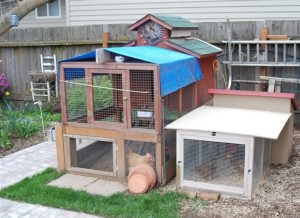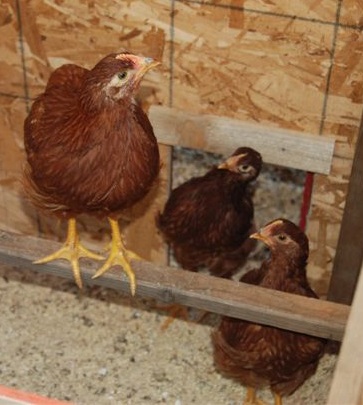Are You Ready for a Backyard Flock?
A Primer for Backyard Chickens
It’s undeniable that baby chicks are adorable…and hard to resist. This time of year, the local feed stores are bursting with little biddies–“Chick Days”–is what they call it. Before you succumb to their $1.99 chick special and walk out with an entire flock of fuzz-balls, consider the Chick Primer points below. These will help you determine if you’re really ready to start a backyard flock of your own (and if you are, by all means hurry to the feed store before all the chicks are gone!).
5 Points to Consider Before Becoming an Urban Mother Hen:
1. What’s your motivation? Let’s start by stating “impulse buy” is not an option here. It’s perfectly fine to adore the chicks in the store, but do not be motivated by an impulse buy! There are lots of great reasons to raise a backyard flock–from fun and folly to food. However, if your only reason is to save money on eggs, then you’re way better off purchasing organic eggs (from cage free hens) from your local grocer. Better yet, visit a farmers market and purchase eggs from a local farmer. While the chicks themselves come “cheap-cheap,” the investment in housing and supplies is not. Hal is pretty sure our very first dozen laid by our girls cost about $300. First and foremost, consider your motive.
2. Are chickens allowed? Before you go any further in fulfilling your urban flock of dreams, check local ordinances to make sure chickens are allowed within city-limits. There is nothing worse than starting a flock, only to be turned in to the authorities by a neighbor who knows the law! Keep yourself out of the fryer and do your due diligence. In Coeur d’Alene, only chickens (hens) are allowed within city-limits; roosters and other types of poultry/fowl (turkeys, ducks, geese, etc.) are not permitted.
3. And speaking of neighbors… It’s a good idea to give neighbors a heads-up to your chicken raising idea. Most objections come from a.) noise and b.) smell. Chickens are relatively quiet (especially when compared to your neighbor’s barking dog), but they will let the neighborhood know when they’ve laid an egg. Thankfully, it’s a short-lived announcement of the day’s work. With good management practices, chickens are nearly odorless too; although prolonged wet conditions can create a “farmyard” smell. Finally, consider your neighbor’s pets–especially dogs. Ol’ Shep, normally low-key, can become a frantic barker when chickens move in next door. Remember, good fences make good neighbors–and sharing a dozen eggs doesn’t hurt either!
4. The urban environment. Where will you be keeping your flock? How safe and secure is the location? Chickens don’t require a lot of living space, which makes raising them in a urban setting possible. However, they do require a safe and secure environment. This consists of a sturdy coop with an attached run, preferably located in a quiet location within a solid-fenced yard. The coop needs to be in place either before you get chicks, or very soon after, since chicks grow and develop at an amazing rate. By the time they reach 4-weeks-old, they will have easily outgrown their “brooder” quarters. They need to be protected from urban predators too. These include  roaming neighborhood pets (including your own), along with raccoons, possums, skunks, and even coyotes. Really. Just because you’ve never seen urban wildlife around your home, doesn’t mean they’re not watching your hen-house! A word of caution regarding pets–don’t be fooled into thinking your own dog (or cat) isn’t a chicken-eater…given the chance…
roaming neighborhood pets (including your own), along with raccoons, possums, skunks, and even coyotes. Really. Just because you’ve never seen urban wildlife around your home, doesn’t mean they’re not watching your hen-house! A word of caution regarding pets–don’t be fooled into thinking your own dog (or cat) isn’t a chicken-eater…given the chance…
5. Consider the responsibility. Chickens are fun, low maintenance, and easy to keep, but they do need daily care and looking after. Did you know that a chicken can live for 10 years or longer? Most do not, simply because their productive “egg-laying” years are limited to about 3. After that, egg production drops off, and usually, so does the chicken. What will you do with your hens when they stop laying? It’s a good idea to have an “exit plan” in place. This may include humanely dispatching or offering unproductive chickens to others (Craig’s List is full of “free” chickens). However, letting them run free in the woods, is not an option. With the increased popularity of raising backyard chickens, humane societies are becoming inundated with “unwanted” chickens. Owning an animal requires commitment–whether it’s a dog or a chicken. Be certain you are ready to take on the responsibility, and treat your chickens with respect at the end of their productive lives.
So how did you do? Is a backyard flock right for you? If it is, the next step is to learn all you can about raising backyard chickens, and start planning your coop. Here are a few excellent online sources to get your started: Backyard Chickens, My Pet Chicken, Murry McMurry Hatchery.
I’ll be sharing more chicken-raising tips in the coming weeks, as we are adding new chicks to our current flock. Yeah, I couldn’t resist.
CdA Coop Peeps, do you have other tips for those considering raising backyard chickens? Share with us in the comments below!









Ok Ok I admit it – I am going to cave………..I am being drawn to the siren song of peep peep at Big Rs……..never done babies before……how soon before I introduce them to the hens?
Oh and I got an egg!!! Yahhhhh – first egg this season……finally!!
Hi Clair, It’s best to wait until the chicks are about 16 weeks old. Below are posts from the last time we introduced new chickens to our existing flock (start with the bottom post first and read up). We’re getting our new chicks on Wednesday!
http://thecoeurdalenecoop.com/flock-integration-so-happy-together/
http://thecoeurdalenecoop.com/sweet-16/
http://thecoeurdalenecoop.com/getting-to-know-you/
http://thecoeurdalenecoop.com/new-chicks-on-the-block/
Hi Candace~I don’t know if you got my message on your communication site or not. I would like to buy a chicken sign just like yours …do you know where I might find one? Could I buy some seeds from you also?~kindly carrie jones
Hi Candice,
You mention some good online resources – although I would also recommend you check out poultrykeeper com- this is an article website and it has got some great information for raising backyard chicken and has been a life saver for me. I think a worthy addition to your list!
Thanks for the great post as always.
Hi, Candice,
First-time chicken parents here – live in CDA near mid-town. We have 3 4-week old chicks that are getting too big for the brooder, but the funky
“Spring” weather has us concerned about moving them outside too soon. With nights in the 30s/40s, what to do? We have a large warmer panel so could set them up in the garage, but that is not insulated and gets as cold as the outside. Suggestions? Thanks!